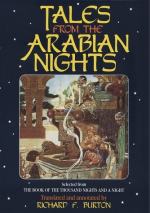for his life and, being skilled in the practice of
every weapon, she escaped the notice of the Queen-dowager
and after donning her war-garb and battle-gear she
went forth to the stable and saddled her a mare and
mounted her and pushed in between the two armies.
And as soon as she saw the usurper charge down upon
the young King as one determined to shed his life’s
blood, she forestalled him and attacked him and tore
out the life from between his ribs. Then she
returned to her apartment nor did any know of the deed
she had done. Presently, when it was eventide
the young King entered the Palace after securing his
succession to royalty; but he was still chafed and
vexed for that he knew not the Knight. His mother
met him and gave him joy of his safety and his accession
to the Sultanate, whereto he made reply, “Ah!
O my mother, my length of days was from the hand of
a horseman who suddenly appearing joined us in our
hardest stress and aided me in my straitest need and
saved me from Death.” Quoth she, “O
my son, hast thou recognised him?” and quoth
he, “’Twas my best desire to discover
him and to stablish him as my Wazir, but this I failed
to do.” Now when the Princess heard these
words she laughed and rejoiced and still laughing
said, “To whoso will make thee acquainted with
him what wilt thou give?” and said he, “Dost
thou know him?” So she replied, “I wot
him not” and he rejoined, “Then what is
the meaning of these thy words?” when she answered
him in these prosaic rhymes:[FN#175]—
“O my lord, may I prove thy sacrifice * Nor
exult at thy sorrows
thine enemies!
Could unease and disease by others be borne * The
slave should
bear load on his lord
that lies:
I’ll carry whatever makes thee complain * And
be my body the
first that dies.”
When he heard these words he again asked, “Dost
thou know him?” and she answered, “He?
Verily we wot him not;"[FN#176] and repeated the saying
to him a second time: withal he by no means understood
her. So quoth she, “How canst thou administer
the Sultanate and yet fail to comprehend my simple
words? For indeed I have made the case clear
to thee.” Hereupon he fathomed the secret
of the saying and flew to her in his joy and clasped
her to his bosom and kissed her upon the cheeks.
But his mother turned to him and said, “O my
son, do not on this wise, for everything hath its
time and season;”—And Shahrazad was
surprised by the dawn of day and fell silent and ceased
to say her permitted say. Then quoth her sister
Dunyazad, “How sweet is thy story, O sister
mine, and how enjoyable and delectable!” Quoth
she, “And where is this compared with that I
would relate to you on the coming night an the Sovran
suffer me to survive?” Now when it was the next
night and that was
The
Three Hundred and Seventy-fourth Night,




